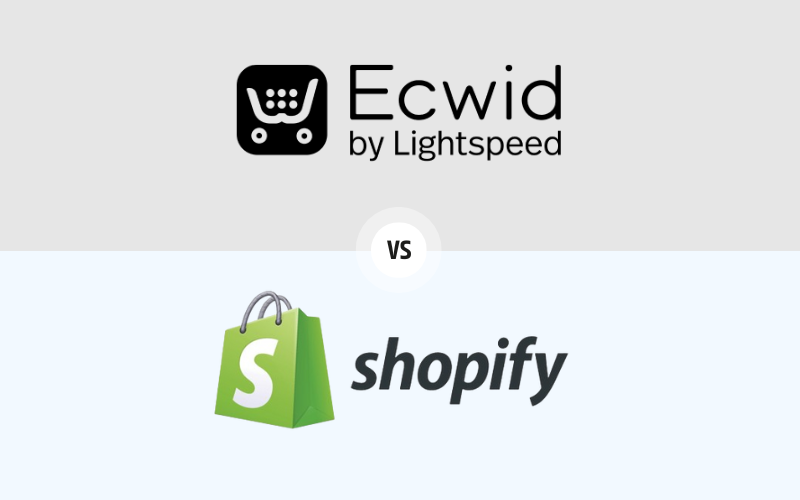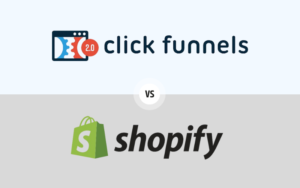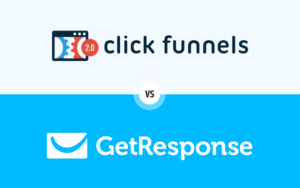It’s Your Life Journey uses affiliate links. If you make a purchase through them, we may receive a small commission (for which we are deeply grateful) at no cost to you.
Key Takeaways:
- Ecwid is a cloud-based e-commerce platform that allows businesses to build an online store or add an online store to their existing website.
- Shopify is an all-in-one e-commerce solution that allows businesses to create a standalone online store from scratch.
- Ecwid is generally easier to use and requires less technical knowledge, while Shopify offers more design and customization options.
Your decision between Ecwid vs Shopify depends on your requirements and budget. If you’re a small business owner in need of an affordable and user-friendly e-commerce solution, Ecwid could be the right fit.
However, if you’re a larger business with more complex needs and resources to invest, Shopify might be the superior choice.
Please continue reading for more information!
Ecwid vs Shopify: Table of Contents
Introduction of Ecwid vs Shopify
When you want to start an online store, it’s really important to pick the right e-commerce platform. Two popular options right now are Ecwid and Shopify. Even though both of them are made to help businesses sell things online, they have some big differences. In this article, I’m going to compare Ecwid vs Shopify in detail to help you choose which one is best for your business.
Overview of Ecwid
Ecwid is a cloud-based e-commerce platform that helps businesses to sell their products or services online. It was founded in 2009 and has since grown to become one of the most popular e-commerce platforms in the world. Ecwid is made to be simple, and it has lots of features that work great for small and medium-sized businesses.
One of the best things about Ecwid is how you can make it your own. It’s designed to work with many different types of websites like WordPress, Wix, and Squarespace. This means you can put Ecwid on your current website without having to build a whole new one from the ground up.

Key Features of Ecwid
I find that Ecwid offers a range of features that make it an excellent choice for businesses of all sizes. Some of the key features of Ecwid include:
- User-Friendly: Ecwid is designed to be user-friendly, even for someone like me with no technical experience. The platform provides a variety of templates and themes that I can use to create a professional-looking online store in just a few minutes.
- Secure: Ecwid prioritizes security and uses advanced measures to protect businesses and their customers. It’s fully PCI compliant and uses SSL encryption to ensure secure transactions.
- Payment options: I appreciate the flexibility that Ecwid offers in terms of payment options. It supports a wide range of payment methods, including PayPal, Stripe, and Authorize.net. This means I can choose the payment options that work best for me and my customers.
- Inventory management: Ecwid comes with a powerful inventory management system that helps businesses to keep track of their stock levels and ensure that they never run out of products.
Overall, Ecwid is an excellent choice for businesses that want to sell online. It is easy to use, highly customizable, and comes with a range of features that make it an ideal choice for businesses of all sizes. Now lets look at Shopify in the Ecwid vs Shopify comparison.

Overview of Shopify
Shopify started back in 2006 and has become one of the most used e-commerce platforms globally. It has some cool features that help businesses run their online stores, like keeping track of what they have to sell and processing payments.
Key Features of Shopify
Let’s talk about some important features that Shopify offers:
- Ease of use: Shopify is famous for being easy to use. It’s not tricky to set up and manage your online store.
- Customizable themes: Shopify gives you lots of themes to choose from, and you can customize them to make your store look unique.
- Payment processing: Shopify offers a range of payment processing options, including credit card processing, PayPal, and more.
- Inventory management: Shopify offers a range of inventory management tools to help you manage stock levels and keep track of products.
- SEO optimization: Shopify offers a range of SEO optimization tools to help improve search engine rankings which can bring in more customers.
In summary, Shopify is a powerful tool for managing online stores. It’s easy to use, offers customizable themes, various payment options, inventory management, and SEO tools. That’s why it’s a popular choice for businesses of all sizes that want to sell things online.

Design and Customization Options in Ecwid vs Shopify
When comparing Ecwid vs Shopify for designing and customizing your online store, both platforms offer a range of options to help you create a unique and visually appealing storefront. Whether you opt for Ecwid or Shopify, you’ll find plenty of tools to make your online store stand out and look great.
Themes and Design Flexibility in Ecwid
Ecwid gives you a lot of themes to choose from, both free and paid. You can customize these themes to make your store look different from others. While the theme selection isn’t as huge as Shopify’s, Ecwid’s themes are modern and work well on mobile devices.
When it comes to changing how your store looks, Ecwid lets you tweak things like colors, fonts, and layout using a drag-and-drop editor. It might not be as fancy as Shopify’s editor, but it’s still easy to use, and you can make changes to your store’s design without knowing any coding.

Themes and Design Flexibility in Shopify
Shopify offers a bunch of themes too, both free and paid. They have themes for all sorts of businesses and styles, so you have lots of choices.
When it comes to changing your store’s appearance, Shopify’s drag-and-drop editor is user-friendly. But here’s the cool part – if you know a bit about coding, Shopify’s Liquid templating language lets you get super creative and make advanced changes to your store’s design.
Summing it up, both Ecwid and Shopify offer ways to design and customize your online store. Shopify boasts a larger theme selection and more advanced design features, especially if you have coding skills. Ecwid, on the other hand, provides modern and mobile-friendly themes, and its user-friendly editor allows for easy customization without coding expertise in the Ecwid vs Shopify comparison.
E-commerce Features and Tools Ecwid vs Shopify
Sales and Marketing Tools Comparison
When it comes to sales and marketing tools in the Ecwid vs Shopify comparison, both platforms provide a variety of features to assist me in promoting and selling my products.
Ecwid comes with useful features like built-in social media integration, allowing me to sell products directly on my Facebook and Instagram pages. Additionally, I can generate discount codes and establish abandoned cart recovery emails to help recover lost sales.
In contrast, Shopify offers a broader range of sales and marketing tools. It enables me to create custom landing pages, set up email marketing campaigns, and utilize built-in SEO tools for optimizing my store for search engines. Shopify’s extensive library of third-party apps and plugins further enhances its sales and marketing capabilities.

Ecwid vs Shopify: Payment Solutions and Fees
Payment Options in Ecwid vs Shopify
Ecwid provides diverse payment options, such as PayPal, Stripe, Square, and more. It supports over 50 payment gateways to cater to your preferences.
Shopify supports over 100 payment gateways, including PayPal and Stripe. It also allows offline payments like cash on delivery or bank transfer. Shopify has its payment gateway, Shopify Payments, offering competitive rates and no transaction fees.
Transaction Fees Comparison of Ecwid vs Shopify
Ecwid charges a 2.9% + $0.30 transaction fee for third-party payment gateways but none for its payment gateway.
Shopify charges a 2.4% + $0.30 transaction fee for third-party gateways. Using Shopify Payments avoids transaction fees.

Ecwid vs Shopify: Integrations and Extensions
As an online store owner, it’s essential to have access to third-party integrations and extensions that can help you enhance your store’s functionality. Looking at Ecwid vs Shopify, both offer a wide range of options which can be easily installed and used.
Third-party Integrations in Ecwid
Ecwid provides a range of integrations and extensions that can help you enhance your store’s functionality. Some of the popular third-party integrations that you can use with Ecwid include:
- Mailchimp: This integration allows you to automate your email marketing campaigns and send targeted emails to your customers.
- QuickBooks: This integration helps you manage your accounting and financial data more efficiently.
- Zapier: This integration allows you to automate your workflow and connect your store with other apps.
- Facebook: Facebook integration enables you to sell your products directly on your Facebook page.
- Google Analytics: This integration helps you track your store’s performance and make data-driven decisions.

Third-party Integrations in Shopify
Shopify also offers a wide range of third-party integrations that can help you enhance your store’s functionality. Some of the popular third-party integrations that you can use with Shopify include:
- Oberlo: This integration allows you to import products from AliExpress and dropship them to your customers.
- Mailchimp: Mailchimp integration allows you to automate your email marketing campaigns and send targeted emails to your customers.
- QuickBooks: This integration helps you manage your accounting and financial data more efficiently.
- Facebook: Facebook integration enables you to sell your products directly on your Facebook page.
- Google Analytics: This integration helps you track your store’s performance and make data-driven decisions.
In conclusion, comparing both Ecwid vs Shopify, they offer a wide range of third-party integrations and extensions that can help you enhance your store’s functionality. While both platforms offer similar integrations, Shopify has a more extensive app store with a broader range of integrations and extensions.
Pros and Cons of Ecwid vs Shopify
Advantages of Ecwid
Ecwid is a good choice for businesses that already have a website. It’s easy to add to your site and can be customized to match your brand. You can also sell on various platforms like social media, online marketplaces, and mobile devices. It’s affordable, with a free plan for small businesses.
Managing your online store is simple with Ecwid. You can handle inventory, track orders, and process payments all in one place. Ecwid also has marketing tools like email marketing, social media integration, and SEO optimization.

Advantages of Shopify
Shopify is popular for starting a new online store from scratch. It offers lots of customization options, including different themes and plugins. Shopify has marketing tools like email marketing, social media integration, and SEO optimization.
Managing your online store is easy with Shopify too. You can manage inventory, track orders, and accept various payments, including credit cards, PayPal, and Apple Pay, all from a single dashboard.
Limitations of Ecwid
Ecwid may not be the best choice for businesses wanting to sell a large number of products. The free plan limits you to selling only up to 10 products, and you’ll need to upgrade to a paid plan to sell more. Additionally, Ecwid charges transaction fees on all sales, which can add up over time.
Another limitation of Ecwid is that it may not suit businesses aiming to heavily customize their online store beyond the platform’s provided options. While it offers customization choices, they might not suffice for businesses with more intricate needs.

Limitations of Shopify
Shopify can be expensive, especially for small businesses. Although it offers various pricing plans, costs can accumulate over time, particularly if you require multiple plugins or themes. Shopify also imposes transaction fees on all sales, which can become costly.
Moreover, Shopify may not be the ideal choice for businesses aiming to sell on multiple platforms. While it provides various integrations, they might not fully meet the needs of businesses wanting to sell on social media, online marketplaces, or mobile devices.
Ecwid vs Shopify Conclusion
In the Ecwid vs Shopify comparison, it’s evident that each platform has its pros and cons.
Ecwid shines in its simplicity and flexibility. It suits small businesses and entrepreneurs seeking to add e-commerce to their existing websites without needing extensive tech skills. Plus, there’s a free plan, making it a budget-friendly choice.
On the flip side, Shopify is a robust platform with advanced features and customization. It’s ideal for businesses aiming to establish a standalone online store and have the means to invest in a comprehensive e-commerce solution. Shopify offers a wide array of integrations and apps to boost your online store’s functionality.
Ultimately, your decision between Ecwid vs Shopify hinges on your specific requirements and budget. If you’re a small business owner in need of an affordable and user-friendly e-commerce solution, Ecwid could be the right fit. However, if you’re a larger business with more complex needs and resources to invest, Shopify might be the superior choice.

Frequently Asked Questions Ecwid vs Shopify
What are the primary differences in cost between Ecwid vs Shopify?
When it comes to pricing, Ecwid and Shopify have different plans to suit different needs. Ecwid has a free plan, but it has limited features. Its paid plans start at $15 per month, which is significantly cheaper than Shopify’s basic plan that starts at $29 per month. However, Shopify offers more features and integrations in its basic plan than Ecwid’s. On the other hand, Shopify’s advanced plans are more expensive than Ecwid’s. So, the cost difference depends on the specific needs of the user.
How does Ecwid compare to Shopify in terms of ease of use?
Both Ecwid and Shopify are user-friendly platforms. However, Ecwid is easier to set up and use than Shopify. Ecwid has a simple interface that allows users to create an online store quickly. Shopify, on the other hand, has a steeper learning curve, but it offers more customization options and features.
What are the limitations of using Ecwid vs Shopify?
Ecwid has some limitations when compared to Shopify. For instance, Ecwid has limited design options, and its checkout process is not customizable. Also, Ecwid does not offer many integrations with third-party apps and services as Shopify does. Additionally, Ecwid has a lower limit on the number of products that can be added to a store.
In what scenarios is Ecwid preferred over Shopify for online selling?
Ecwid is preferred over Shopify in scenarios where users want a simple and easy-to-use platform to sell products online. Ecwid is also a good choice for users who want to integrate their online store with their existing website or social media pages. Additionally, Ecwid is a more affordable option for small businesses that have a limited budget.
What advantages does Shopify offer that might make it a better choice than Ecwid?
Shopify offers more advanced features and customization options than Ecwid. Shopify also has better integrations with third-party apps and services. Additionally, Shopify has a larger community of users and developers, which means there are more resources available for users to learn and get help. Finally, Shopify is a better choice for larger businesses that need more advanced features and scalability.
Did you enjoy this Ecwid vs Shopify review? Check out my other post where I discuss if Shopify is Legit.




![Read more about the article Moosend vs TinyEmail: Best Email Marketing For You [2024]](https://itsyourlifejourney.com/wp-content/uploads/2023/12/Yellow-Modern-Football-Match-Highlights-Youtube-Thumbnail1-300x188.png)
Pingback: AI Note Taking Secrets: Boost Your Productivity and Save Time - It's Your Life Journey